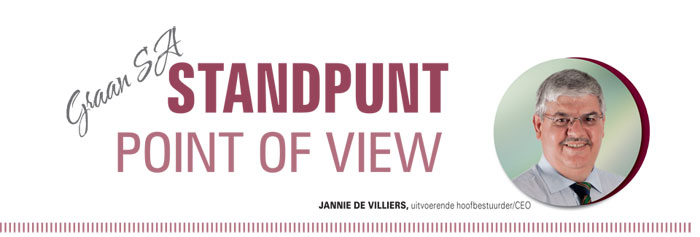November 2015

JANNIE DE VILLIERS, uitvoerende hoofbestuurder/CEO
Afew years ago I read a book about leadership styles in times of change. The writer (Alan Roxburgh: Crossing the Bridge) went to a lot of trouble to explain what happens when society is experiencing change and what you as a leader need to do under such circumstances.
His description of change is: Change takes place when deep-seated beliefs begin to disappear or when there is doubt about them. South Africa is currently in such a place. We are not certain if a light will actually go on when you switch it on and many towns and cities are even uncertain about the water in their taps.
As landowners we are not so certain that we will be able to keep our land. The church is making decisions that conflict with our deeply rooted religious beliefs and the drought and weather forecasts about more droughts are squarely staring down our faith as grain producers. What are we to do when every weather forecaster, and now even the politicians, are predicting three years of drought? It is challenging our steadfast faith!
The drought of 2015 is still in the process of leaving deep scars in our grain community. In the north western parts of our country it is something that is not so uncommon, but the Swartland region definitely has much less experience of such droughts. The wheat standing on the fields, and even those that in some places still look green, have empty kernels. (To me it seems similar to people in our country who are filling jobs, but fail to render a service...) Empty ears of wheat do not pay salaries or loan installments or buy diesel.
We may be applying the best agricultural practices, but plants cannot grow without water. Our hearts go out to those of you who are not merely following the drought on the television, but who experience it in the fields. We know it is only you who have the responsibility to turn the conditions in the fields into cash and who really understand the impact of the drought.
There has always been a deeply rooted, healthy relationship between Grain SA and the different grain trusts. The grain producers were there when these trusts were initiated, but this is also changing. New trustees with different views and limited knowledge about where the money comes from and for what purpose the trusts were established, are making it increasingly difficult.
In last year’s annual report we already endeavoured to pass on this fact about the changing relationship. The good news is that the old always makes way for the new. We will give further feedback about this in the near future. However, my issue today is about what we are to do about deep-seated beliefs that are changing and what the task of a leader is under such conditions.
Roxburgh’s advice is that one must once again dig deep to unearth the engrained truths which we still believe in and which we can cling to. This is what we have to keep reminding each other about. He, inter alia, mentions the example of Daniel who in exile remained loyal to the truths in which he firmly believed, even though everything around him was foreign.
People in these times continually pass to and fro over a bridge of the old and the new. Your job as a leader is to stand on the bridge to give the bewildered people direction with fixed truths. Working harder and running faster is not going to work so well in this phase. There are many emotions, diverse views of, and actions regarding the same things.
One thing is clear to me however and that is that the grain industry will have to draw a new framework and playing field for the future and that we will have to enter into new relationships with our current partners to operate even more independently from the government and produce sustainably. It is going to take time. There is no training for it and Google Maps does not have a map for this one. Have courage!
Publication: November 2015
Section: Features